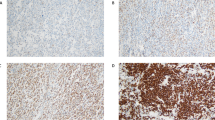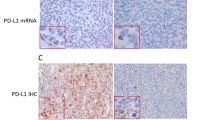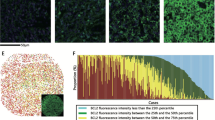Abstract
B-cell high-grade lymphomas are heterogeneous in terms of histology, clinical presentation, treatment response and prognosis. As bcl-2 and p53 gene deregulations are frequently involved in several types of lymphoid malignancies, we aimed our investigation at the study of the relation between bcl-2 and p53 expression and survival probability in a group of 119 patients with B-cell high-grade lymphoma. These were obtained from the Virgen de la Salud Hospital, Toledo, Spain (73 cases), John Radcliffe Hospital, Oxford, UK (31 cases), and the Istituto Nazionale dei Tumori, Milan, Italy (15 cases). The relation between bcl-2 protein expression and survival was small, depending on the primary localisation of the tumour (in lymph node of mucosae), and lacked a significant correlation with overall survival. In contrast with this, p53 expression was related to survival probability in our series, this relation being both significant and independent of histological diagnosis. p53-positive patients showed a sudden decrease in life expectancy in the first months after diagnosis. Multivariant regression analysis confirmed that the only parameters significantly related with survival were extranodal origin, which is associated with a better prognosis, and p53 expression, which indicates a poor prognosis. Simultaneous expression of bcl-2 and p53 was associated with a poorer prognosis than p53 alone. This is particularly significant for large B-cell lymphomas presenting in lymph nodes. The cumulative poor effect of both p53 and bcl-2 in large B-cell lymphomas, which is more significant in nodal tumours, could confirm the existence of a multistep genetic deregulation in non-Hodgkin's lymphoma. This indicates that the genetic mechanisms controlling apoptosis and their disregulation are critical steps in the progression of lymphomas.
This is a preview of subscription content, access via your institution
Access options
Subscribe to this journal
Receive 24 print issues and online access
$259.00 per year
only $10.79 per issue
Buy this article
- Purchase on Springer Link
- Instant access to full article PDF
Prices may be subject to local taxes which are calculated during checkout
Similar content being viewed by others
Author information
Authors and Affiliations
Rights and permissions
About this article
Cite this article
Piris, M., Pezzella, F., Martinez-Montero, J. et al. p53 and bcl-2 expression in high-grade B-cell lymphomas: correlation with survival time. Br J Cancer 69, 337–341 (1994). https://doi.org/10.1038/bjc.1994.61
Issue Date:
DOI: https://doi.org/10.1038/bjc.1994.61



